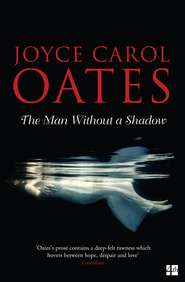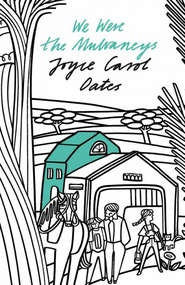По всем вопросам обращайтесь на: info@litportal.ru
(©) 2003-2025.
✖
The Sacrifice
Автор
Год написания книги
2019
Настройки чтения
Размер шрифта
Высота строк
Поля
“If you saw a van, you could maybe compare it to the van they’d taken you in? You could try to describe it?”
Sybilla shook her head yes. She could try.
“When they left you in the factory cellar, they told you they would kill you, if you told anyone? Who said these words?”
Sybilla shook her head, she didn’t know.
“Did one of the men say this, or others? Did they all say this?”
Sybilla hid her face in her hands. Mrs. Frye whispered to her, and drew her hands away.
The interview had exhausted the girl. Iglesias was exhausted.
Thinking White cop! White cop.
Thinking None of this story is true. This is all a lie. The mother has coached her. The mother has beat her. The mother’s boyfriend—her own boyfriend—someone she knows …
Mrs. Frye was embracing her daughter. The two of them were weeping, wet-eyed.
“Ma’am, this interview over now. My girl got to get home where she safe, and her mama can take care of her.”
And there was no recording of this interview! Iglesias had known that was a mistake.
Only her notes, and the bright yellow Post-its.
Only her word.
“Mrs. Frye, if we could just—a few more minutes, and …”
“I said no! My daughter’s health come first, before anythin else. You got this girl to tell you somethin could get her killed, and you better not misuse it, or S’b’lla, I’m warnin you—Off’cer.”
Off’cer was spoken in indignation as Mrs. Frye heaved herself up from the gurney and gathered Sybilla into her arms. The girl was unresisting now, and hid her face in the older woman’s bosom.
Iglesias backed away sick and stunned.
“‘White cop.’”
Her very mouth seemed to have gone numb.
And how many times in the weeks and months to come would the thought come to her, remorse like a stab in the gut—But what if it is true? What if white men did debase her? And we didn’t believe her? God help me to know what is truth and what is false.
Red Rock (#ulink_067e68ee-ddd5-5c38-8c4d-6b74a8c00e69)
Hog-tied and left to die.
The Frye girl, fourteen. Beaten and raped and shit-on and left to die in some factory cellar.
She sayin it was white cops. In a cop-van drivin around with a black girl they arrest like pretendin she a hooker so they use her like some sex-slave, then they rub shit on her, and write nasty words on her, and dump her and left her to die.
Except she ain’t die, she been rescued. By her own lady schoolteacher! Aint died and tellin what the white cops done now see what the fuckers gon do, to punish themselves.
In Red Rock it began to be told. In the small storefront businesses, in the taverns, rib joints and diners of Camden Avenue, Penescott, Ventor, Twelfth. In the brownstone row houses of Third, Fourth, Fifth and Sixth streets and in the tenements of East Ventor, Crater, and Depp. In the several towers of the Earl Warren high-rise project on the river at Twelfth Street, its gritty-floored foyers, erratically operating elevators, shadowy staircases and corridors and vast open courtyards ravaged as earth over which a Biblical pestilence has raged. In the hair salons, nail salons, wig shops, beer wine and liquor stores, groceries and pawnshops and bail-bond shops and Red Rock’s single drugstore—(a bleak Walgreens of narrow corridors and a low stamped-tin ceiling doomed for closure within the year)—at the windswept intersection of Camden and Freund. In Passaic County Family Services, Polk Memorial Medical Center, Planned Parenthood and Veterans’ Furniture Outlet and Goodwill as in the defaced bus shelters of Camden, Trenton, Crater, Jersey and West River Street. In the vicinity of the Pascayne Police Department Fifth Precinct on First Street with its commandeered side streets of white-and-green cruisers and vans parked as in a stalled but belligerent military formation. In the shadow of the Pitcairn Bridge rising hunched above the river and running parallel with the New Jersey Transit railroad bridge that in turn ran parallel with the elevated Turnpike bridge blotting out much of the eastern sky above Red Rock. In the sandstone tenement buildings like corroded pueblo dwellings of an ancient time jutting up against the elevated spiraling lanes of the Turnpike. In Hicks Square, in Polk Plaza, in the weedy no-man’s-land littered with bottles, cans, styrofoam containers, junkies’ needles and used condoms like shrunken sea slugs abutting the Passaic River at Washburn where the city had intended a park. In the drab factory-like Pascayne South High School where Sybilla Frye was a tenth-grade student and in Ed-son Middle School and in even Edson Elementary where she’d been a student when younger it began to be told, and retold.
That Frye girl gone missin you hear she been found? In that fish-factory cellar she left for dead all tied-up and bleedin these white cops grabbed her comin out of school Thu’sday sayin they got warrants to arrest her she be missin school an take her away in the police van. We saw it—right outside the school.
Left her for dead, they’d been beating and raping and starving her. She’d lost more’n half her blood. Branded KKK in her skin with hot irons. Carved nasty words on her back. They’d picked her up outside the high school there was witnesses saw the white cops takin her away in a cop van tryin to say she a nigger hooker her pimp give to them for payment. Kept the girl tied up for three days while her mother lookin for her on every street, we seen that poor woman showin pictures of the girl to anybody who would look. They raped her, beat and kicked her an rolled her in dog shit an told her they would cut her throat an her family’s if she told and they told her nobody would ever believe her, take the word of a nigger slut against the word of white cops and they left her to die in that nasty place where in ’67 they dumped people they’d shot in the street and nobody found the bodies for a long time. But this girl didn’t die.
“S’quest’d” (#ulink_eca8a990-47f4-503f-8ad7-81ecd52d494d)
Where my baby? She s’quest’d. She aint here. She sick, and she gon get well. You leave my baby alone!
In the brownstone row house at 939 Third Street the agitated mother scarcely opened the front door but shouted through a narrow crack for would-be visitors to go away. Initially, Mrs. Frye had tried to determine who it was ringing the bell or rapping loudly at the door when the buzzer-bell failed to sound, a familiar face, relatives, girlfriends of Sybilla’s, incensed and sympathetic neighbors or strangers—so many strangers!—then in a frenzy of fear and dismay she turned them all away slamming the door in their faces.
Through the windows Ednetta Frye could be seen, a shifting shadow-shape, peeking out at the edges of the drawn blinds. Her figure was both hulking and tremulous. Muttering to herself God help us. God help us through this mis’ry.
It was known, Sybilla Frye was being kept home from school. Days in succession following the news of her discovery in the Jersey Foods factory she was absent from Pascayne High South where she was a sophomore with what school authorities were acknowledging was a spotty record—a history of sporadic and unexplained absences already since the start of the fall term after Labor Day and the previous year in ninth grade as well.
Questioned by authorities about the assaulted girl, the principal of the high school had no recollection of her nor did her teachers speak of “Sybilla Frye” with much certainty—classes at Pascayne South were overcrowded, students sat in seats not always assigned to them, Sybilla’s homeroom teacher had taken sick days in September during which time substitutes had monitored the thirty or more students in the homeroom and none of these had any clear recollection of “Sybilla Frye” still less any information about her.
Nor did Sybilla’s classmates wish to speak of her except in the most vague terms—S’b’lla be out of school, somethin happen to her.
When someone from the high school called, Ednetta Frye interrupted without listening to whatever question, request, message this stranger had for her—My daughter not livin in this house right now! She s’quest’d somewhere safe. Repeated calls, Ednetta picked up the receiver and slammed it down without listening.
Juvenile Aid of New Jersey, Child Protective Services, Passaic County Family Services—calls from these agencies, Ednetta Frye dealt with in a similar fashion. Individuals from these agencies, even those dark-skinned and female like herself, Ednetta Frye turned away brusquely from her door.
She s’quest’d where you can’t get her! Just go away an leave us like you ever give a damn for us!
The Hispanic female police detective who’d pretended to be Ednetta’s friend in the hospital ER returned, with a (male, Italian-looking) detective-companion who stared at Ednetta with an expression of barely concealed contempt. Ednetta had seen the white-and-green Pascayne PD cruiser park at the curb only a few yards away from the window at which she crouched pressing the palm of her hand into her chest as she panted in pain and apprehension—Jesus help me. Jesus send these people away—and she guessed she had no choice but to open the door to them, at least a crack, for possibly they had a search warrant? a warrant for arrest?—though which of them it might be, Sybilla, or herself, who’d be arrested, Ednetta had no idea. She was near-fainting with anxiety. High-blood-pressure pounded in her ears. As the female detective knocked Ednetta snatched open the door saying in a hoarse pleading voice what sounded to the detectives like—My baby s’quest’d! She ain’t here! Can’t talk to you now gon shut this door.
The female detective—(Ednetta hadn’t caught the name, much of what other people said in recent days flew past Ednetta’s consciousness like panicked birds whose beating wings you ducked to avoid)—tried to prevent her from shutting the door. Saying it was crucial that she speak with Sybilla, and with her. The female detective’s companion was standing beside her grim-faced staring at Ednetta through the two-inch crack between the door and the doorframe and Ednetta saw in the man’s ice pick eyes the look that signaled We know you are lying you God damn fuckin nigger bitch you will regret this.
The female detective—“Iglesias”—was trying to speak calmly to Ednetta. Seeing that Ednetta was in an excitable mood. (Both cops alert to whether the distraught and panting heavyset black woman might’ve been hiding a butcher knife behind her broad hips, or a hand gun.) Telling her that she, Iglesias, was her friend; and she’d brought with her Detective ___ —whose name Ednetta could not have heard even if she’d wanted to hear it, blood pumping in her ears; and they hoped for just a few minutes of her time, and if they could please speak with Sybilla … And Ednetta said sharply Ma’am I told you you can’t! My baby aint in this house she s’quest’d somewhere safe.
Iglesias seemed not to hear. Not to understand.
S’quest’d? “Sequestered”?
Quickly Ednetta shut the door. Her heart was pounding so hard in her billowy chest, she’d have thought it was an angry fist demanding release.
From inside Ednetta could see Iglesias and the other detective outside on the step conferring what to do. Shrewdly she reasoned that the detectives didn’t have a warrant to enter the house—if they had, they’d have entered the house; nor did they have a warrant to arrest her or Sybilla. (Could you arrest someone for being a victim? Could you arrest someone for being a victim’s mother?) Still, Ednetta was remembering the martial law days and nights of August 1967 when SWAT teams stormed Red Rock houses in a hail of bullets or threw tear gas containers or firebombs into dwellings like this in a pretext of “neutralizing” sniper fire. She hadn’t known Anis Schutt then but knew of how Anis’s (unarmed) sixteen-year-old brother Lyander had been murdered by city police for stepping outside his mother’s house on Freund Street five minutes after the 9:00 P.M. curfew. A sixty-year-old great-aunt of Ednetta’s living in a first-floor apartment in the Roosevelt project had been shot dead through a window unwisely passing in front of a blind with a harsh light behind it—another “sniper” casualty.
Iglesias was calling through cupped hands not in a threatening-cop voice but a friendly-female voice—Mrs. Frye? Please? We can just speak with you. This is crucial for our investigation.
Ednetta retreated to the rear of the house. Ednetta climbed panting and sweating to the second floor of the house. Ednetta hid away in her and Anis’s bedroom whimpering like a wounded creature sprawled on the bed covering her head with a blanket. Jesus help me. Jesus forgive me. None of this my fault Jesus!
When she revived, the house was quiet. She listened hard to hear if the detectives were knocking on the door, calling for her, but they were not.
She’d heard a vehicle in the street, pulling away. She hoped this was the police cruiser.











